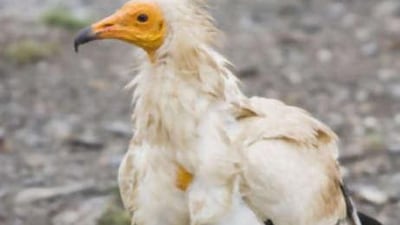NEW YORK // Plans to assemble a team of six experts in Abu Dhabi to oversee bird preservation efforts in the Gulf herald a new era in the fight to protect species around the world, a senior UN official said yesterday. The UAE agreed to host the team after ratifying a memorandum of understanding last week for worldwide co-operation against the threat to migratory birds, an agreement signed by 27 other countries that comes into effect on Saturday.
The MoU is seen as a precursor to the UN Convention on Migratory Species, which aims to halt the decline of species such as falcons, eagles and ospreys. "The establishment of this tri-continental agreement for birds of prey, with a co-ordinating unit in Abu Dhabi, marks a new era for the convention," said Robert Hepworth, executive secretary of the UN Environment Programme's bird convention. "Here in the Gulf, at the crossroads of migration and culture, we have a chance to establish a new UN base for wildlife conservation.
"This vital new agreement will not only help raptors, which are at the top of the food chain, but also other 'nomads of the air' throughout their journeys. We expect the sharp decline of birds of prey to stop and to see their populations eventually recover." The UAE has yet to sign the Convention but said it was willing to fund the initiative's secretariat in Abu Dhabi. Many rare species of predatory birds visit the country, including the Greater Spotted Eagle, the Egyptian vulture and the osprey, of which some 70 pairs breed on offshore islands in the emirate's waters.
The Government has long supported efforts to promote the survival of falcons, a national symbol of the Emirates and historically the cherished hunter used by Bedouin falconers to capture prey. But birds of prey, like many others protected under the new agreement, are increasingly suffering as their habitats are encroached upon by farmland, forestry and sprawling cities. Conservationists have concerns about more than half all migratory birds of prey, which are increasingly being poisoned by industrial and agricultural toxins or flying into electricity cables.
"Each year millions of birds pass through the Middle East as they travel between Europe and Africa," said Ibrahim al Khader, head of BirdLife Middle East. "This important agreement will help ensure that migratory birds of prey and owls, including some of the world's most charismatic and threatened species, have a safer passage during their epic annual journeys." The large saker falcon has declined rapidly in recent years and is listed as an endangered species, but illegal traders capture thousands annually and sell them to wealthy Gulf hunters.
Countries that signed up to the agreement, including Pakistan, Mongolia and Sudan, are committed to protecting birds of prey from illegal killing and safeguarding their habitats. Dr Sali Javed, deputy bird conservation chief at the Environment Agency-Abu Dhabi, said: "We hope that this is just the beginning of an impressive journey that we have started to protect such a fascinating group of birds."
The conservation team will gather information about falcons, ospreys, owls and other hunting birds, analyse their biology, habitat and migration routes, and build a database of knowledge that will assist protection efforts. The experts will focus on "bottleneck sites" where large numbers of raptors concentrate while migrating from their breeding grounds in the northern hemisphere to wintering territory in the south.
The Government began negotiating the agreement with UK officials in Scotland last year, encouraging other countries to sign up and co-ordinate efforts to protect more than 70 species of migratory birds of prey. Huw Irranca-Davies, the British minister for wildlife, said: "These measures will protect birds of prey along the whole route that they travel on their annual migration, which can cross the boundaries of many different countries with different laws to protect wildlife."
jreinl@thenational.ae


